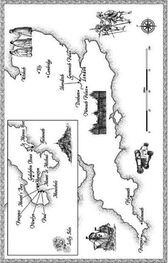“If I may speed the process, magistrate?” Verres asked.
The magistrate shrugged and gestured for him to continue.
“Since my duties are not required in the role of familiae emptor, I have no matters to address in it. May I suggest that I withdraw all opposition to the suit of Batiatus, and depart as friend.”
Timarchides leapt to his feet in surprise, grabbing at Verres’s toga.
“You said that purse was mine!”
Verres held out his arms in conciliation.
“Timarchides, please!” he said. “The magistrate has spoken. We must abide by Roman law or we are no better than barbarians.”
“But-”
“What purse?” Helva asked, indicating the pile of scrolls. He held one up for them to see. “You will see from the accounts that the estate of Pelorus is already well discharged, almost into nothingness.”
POSTERITAS
“Do I dream,” Batiatus said, standing on the steps of the forum, “or did we just get bent over and fucked?”
“I have no idea of your dreams, Batiatus,” Cicero said, his eyes set ahead. The two men sighed in unison on the steps, and began to dawdle toward the street level. Varro walked behind, ever watchful.
“The magistrate made no note of our evidence,” Batiatus protested. “Rather keeping up the nonsense of the ‘last words’!”
“The magistrate showed himself to be a masterful diplomat,” Cicero replied. “Governors are not truly sacrosanct, but it is beneficial for the smooth running of the state if we assume that they are. Absent a truly monstrous cause, it is better to remove all talk of crime. The magistrate allowed each man to depart unsullied by accusation.”
“But I want Verres fucking sullied ! I want him up to his neck in shit! He walks away with head held high.”
“But absent control of the Pelorus estate.”
Something was moving to the side of the two men, something oncoming with the speed of a charging gladiator, something in bright white edged with Greek borders. Batiatus turned to see, and found Varro bodily holding back the angry Timarchides.
“You will pay for this, Cicero,” the freedman snarled.
“Will I?”
“You steal from me. You rob the grave of a great man.”
Timarchides hurled Varro to one side, leaving the blond gladiator reeling in the dirt. But the slave had served his purpose, calming the angry Greek just enough to prevent him coming to blows with a noble Roman. Instead, Cicero faced no more than a pointing finger and a torrent of abuse.
“I merely made investigation into a suspicious abuse of power,” Cicero said calmly, when Timarchides eventually paused for breath.
“Listen well, Timarchides,” Batiatus crowed, “You and Verres have reached agreement’s end, your sullied fingers remain empty as will Pelorus’s house when next you seek shelter!”
“I am disinherited!” Timarchides growled. “Left with nothing!”
“From nothing left nothing!” Batiatus replied. “Returned to the heavy work of arm twisting, save now for Verres in Sicilia.”
“Pelorus would not have desired this.”
“I grow weary of this ludicrous performance,” Cicero said, suddenly impatient. “Pelorus did not want to die.”
Timarchides stood, fists clenched, before them breathing heavily for lack of words and direction. Varro clambered back to his feet, rendering the odds once more against the Greek. Batiatus stared directly into Timarchides’s angry eyes for a moment, before walking away with a dismissive wave of his hand.
“Might I suggest,” Cicero said, “that the freedman Timarchides composes a will forthwith. If you were to die intestate, in the fashion of your former master, then your property would revert to Pelorus, who reverts to Batiatus, and you would end up leaving everything to the man you so despise.”
“Enough of such legal knots,” Timarchides spat. “I depart for Sicilia, and curse you all.”
“Knots of your own making. Matters would be eased if you but had a son.”
“Then I shall go out and sire one tonight!”
“A difficult task when men lay with men.” Cicero called after Timarchides’s retreating back. He sighed with the effort of a day’s work well done, and sauntered after Batiatus, who slowed his pace now that the danger of physical assault was past.
“Cicero, I stand amazed,” the lanista said.
“Do not be,” Cicero said, oddly sour. “There is no victory to be celebrated here.”
“On the contrary, you have executed every action exact.”
“I have done nothing. It is a disaster.”
“You make reference to the business of Verres being governor? An inconvenient ‘window,’ to be sure.”
“The means by which he could be held accountable destroyed, and if he is not accountable then he is removed entirely from deliberations. He disappears. As if Verres was never here.”
“Which means?”
“Which means that Pelorus died by means unknown in a slave attack. Absent will, which means everything lands upon you.”
“My meaning exact! The slaves are dead and purse empty, but the villa is mine!”
Batiatus puffed out his chest and looked around him at the bustle of Neapolis, wondering what to buy first. He hailed a vendor with a pole draped with wineskins.
“Not so, Batiatus,” Cicero said glumly, as the lanista handed over coins. “I possess knowledge enough of legal mind to know where thought alights.”
Batiatus offered him a swig from his celebratory wineskin, but Cicero pushed it away.
“Tell me,” Batiatus said, wiping a red smear of wine across his cheek, “why the result disappoints.”
Cicero backed into the shade, narrowly evading a cart drawn by two horses. He stared after the retreating vehicle, watching as its driver skillfully negotiated its passage through the next junction, and on to the road out of town.
“Look upon that horse, Batiatus. If horse breaks free and charges through street, with whom does the responsibility rest?”
“What is your meaning?” Batiatus asked.
“Is fault with horse?”
“Of course not.”
“And if horse ends life of passing woman and grieving husband seeks redress. Can he seek it from horse?” Cicero asked.
“You expect apology from a horse?”
“That is not possible, you are right,” Cicero said. “So would you stone the horse to death?”
Though tasked with remaining silent, Varro could not resist a chuckle.
“That is ludicrous,” Batiatus replied. “You cannot lay blame with dumb animal.”
“Then who bears burden of responsibility?”
“The owner of course!”
“And what if criminal is not animal, but slave?”
“He will be killed. In the same manner as the slaves at the House of Pelorus.”
“Ah,” Cicero said. “That is their punishment, but what of damages they did to others?”
Batiatus had been midway through another long gulp of wine. Instead, it somehow caught in his throat, causing him to spit and splutter a pink mist into the street.
“What?” he coughed. “Your meaning is that liability will rest with me for everything?”
“There will be dispensations to Timarchides, to the musicians, to all the guests that claim some blemish or inconvenience, in atonement for the actions of the slaves you have just inherited .”
“It cannot be inheritance if subjects are already in Hades!”
“Oh, but it can. Or rather, their debts are your inheritance! It would surprise me not if the beneficiary of Pelorus’s estate received strong encouragement to honor ‘noble’ Verres’s obligations and was forced to pay pension rashly promised to Successa. With lesser stipends for other whores. And band. And citizens present. There will also be liability for bills outstanding to caterers and vintners.”
Читать дальше






